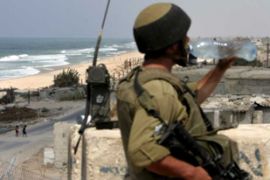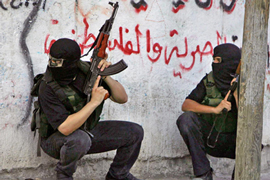Israel ‘reduces Gaza fuel supplies’
Gazans prepare for the worst, though Israel denies enforcing energy cutbacks.

|
“The question is will Fatah be strong enough to contain such a powerful ‘partner’ or will it be just exploited and eroded over time? Werewolf, Micronesia |
“We sent the supplying company the same daily requests, but they said they were sorry and that because of the new imposed sanctions they could only send us a reduced quantity,” Salama said.
Al Jazeera’s Nour Odeh said that the people of Gaza are expecting a gradual cut that will decidedly deteriorate their standard of living.
She said the Palestinian Authority had acted prematurely in announcing that a cut had been implemented. She emphasised that it was a game of “wait and see”.
Israeli denial
Captain Shahdi Yassin, a spokesman for the Israeli defence ministry office that liaises with the Palestinian Authority, said on Sunday: “No instructions have been received from the defence minister, and therefore there have not been any cutbacks.”
Israel says it is seeking non-violent ways of pressuring Hamas to stop cross-border rocket attacks.
Mark Regev, Israel‘s foreign ministry spokesman, said: “The people of Gaza are not our enemies, our enemies are those people who are shooting rockets into Israel and killing our civilians.”
The chairman of the Palestinian Legislative Council’s political committee said that Israel was putting further pressure on Palestinian civilians.
“Israel has embarked on a sanction that is meant to subdue the Palestinians, to force them to surrender to the Israeli will. It is affecting their daily lives,” Abdallah Abdallah said.
“This is a practice which is termed by international law and international humanitarian law as a crime against humanity.
“This should not pass without being punished by the international community.”
Illegal punishment
Earlier a defence spokesman said that “juridical problems are still to be resolved” concerning the cuts.
The problems refer to possible legal action by Israeli human rights organisations which, like the Palestinians, consider the sanctions as a form of collective punishment of civilians – a move considered illegal.
The United Nations has told Israel it must not inflict collective punishment by denying vital supplies to Gaza‘s 1.5 million residents.
John Ging, from the United Nations Relief and Works Agency (Unrwa), said the problem was not going to be solved by increasing the humanitarian misery of the people of Gaza who are not the enemy to Israel.
Meanwhile Regev told Al Jazeera that Israel does not believe in collective punishment and that it is committed to a steady flow of humanitarian support for the Palestinian people.
Paralysing Gaza
The Israeli military claims that since Hamas took control of the Gaza Strip in mid-June, about 1,000 rockets and mortar rounds have been fired at Israel, wounding dozens of people.
Matan Vilnai, Israel‘s deputy defence minister, said on Saturday that Israel planned to paralyse the infrastructure of the Gaza Strip and separate itself completely from the Palestinian territory in the longer term.
 |
| Israel has tightened its grip on Gaza since Hamas seized the territory in June [AFP] |
“We want to separate ourselves from the Gaza Strip at the level of its infrastructure in every way possible,” Vilnai told Israeli public radio.
Vilnai said the measures were not really because of the rocket firing “but really to achieve the separation of this territory, which was approved in principle two weeks ago by the Israeli government, and whose application had only been delayed for a simple legalistic check”.
In September, the Israeli security cabinet decreed the Gaza Strip “a hostile entity”.
“Long term, we want to separate ourselves from this territory, 100 per cent,” Vilnai said, adding that Israel was providing all the fuel that the Gaza Strip needed, as well as two-thirds of its electricity.
“Currently, more than 100 lorries loaded with food and basic necessities coming from Israel enter the Gaza Strip each day to avoid a humanitarian crisis, but we also have to find an alternative solution at this level,” Vilnai said.
Since the Hamas takeover, the Israelis have imposed a tight grip around the Gaza Strip, closing crossing points and allowing only essential goods to enter the territory.